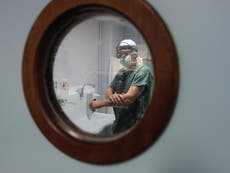Politics is suspended by coronavirus – but it will be back for the next phase
Left, right or centre – we don’t know enough about the virus to make ideological statements about its impact on the UK

People want the coronavirus pandemic to mean something, so it is no surprise that we use it as evidence for what we already believe.
For those opposed to global capitalism, it turns out that global capitalism is to blame. But we had the Black Death in the 14th century; admittedly, this pandemic moved faster thanks to air travel, but on the other hand, the medical care is better.
For those worried about the power of authoritarian China, the disease proves that Xi Jinping is up to no good, although you would have thought the detention of 1 million Uighurs was sufficient proof of that.
Closer to home, the outbreak was bound to be seen through the prism of domestic politics. Jeremy Corbyn’s claim that the government’s response proved he was “absolutely right” was not even the silliest example.
Matthew Parris had some fun in The Spectator this week by guessing what commentators have said about it, and then looking them up to find that they had. For Polly Toynbee of The Guardian, the virus revealed that the NHS and social care are “brutally worn down by a decade of needless, ideologically driven austerity”. While for Charles Moore in The Daily Telegraph, it exposed “the inflexibility of our lumbering NHS”, which is “why the country has had to shut down”.
Parris acknowledges that he himself is not immune to the contagion of confirmation bias. As a Conservative who is suspicious of Boris Johnson, he admits he has tried to “find a way of representing this pandemic as overhyped”.
Which is interesting, because Parris’s criticism is representative of the right, which tends to argue that the government has overreacted, sacrificing the economy and civil liberties in an attempt – based on inadequate information – to curb the spread of the virus. They say that if the daily death toll peaked last weekend, it suggests that the “lockdown” announced on 23 March was unnecessary, because the previous measures were working after a three-week lag.
The criticism from the left, on the contrary, tends to be that the government failed to react quickly enough, and that if it had locked down earlier, lives would have been saved.
Personally, I would rather not take a view. I don’t care if this makes me a centrist, which is not a label I’m keen on, but I don’t think we know enough about the virus to be sure either way. If it turns out that one side is right and the other wrong that won’t vindicate that side’s ideology; it just means we will have found out more about how the virus works.
Meanwhile, Johnson has a cast-iron, copper-bottomed and gold-plated defence either way, which is that he acted on the advice of Sage, the Scientific Advisory Group for Emergencies. Anyone who disagrees with that advice should take it up with Patrick Vallance, the government’s chief scientific adviser, who chairs the committee.
For a scientist, or a centrist, the coronavirus doesn’t mean anything. It is a chaotic event to which we have to respond as best we can. Once we get past the tiny minority of people who believe governments should have no role in dealing with it, politics doesn’t matter.
That is why Corbyn’s comment was so absurd, and it is also why Keir Starmer has made such a colourless entrance to the political front rank: his criticisms of the government are administrative and procedural, not ideological.
Politics will reassert itself for the next phase, however. The questions of how we get out of the post-coronavirus recession are likely to be intensely political, and quite familiar. This will probably be the third period in postwar British history to be described as one of “austerity”.
Soon there will be real political choices to be made about how to manage the economy and the public finances. The right will worry more about the national debt and the left will worry more about the condition of the poor. Then centrists will have to choose sides.







Join our commenting forum
Join thought-provoking conversations, follow other Independent readers and see their replies